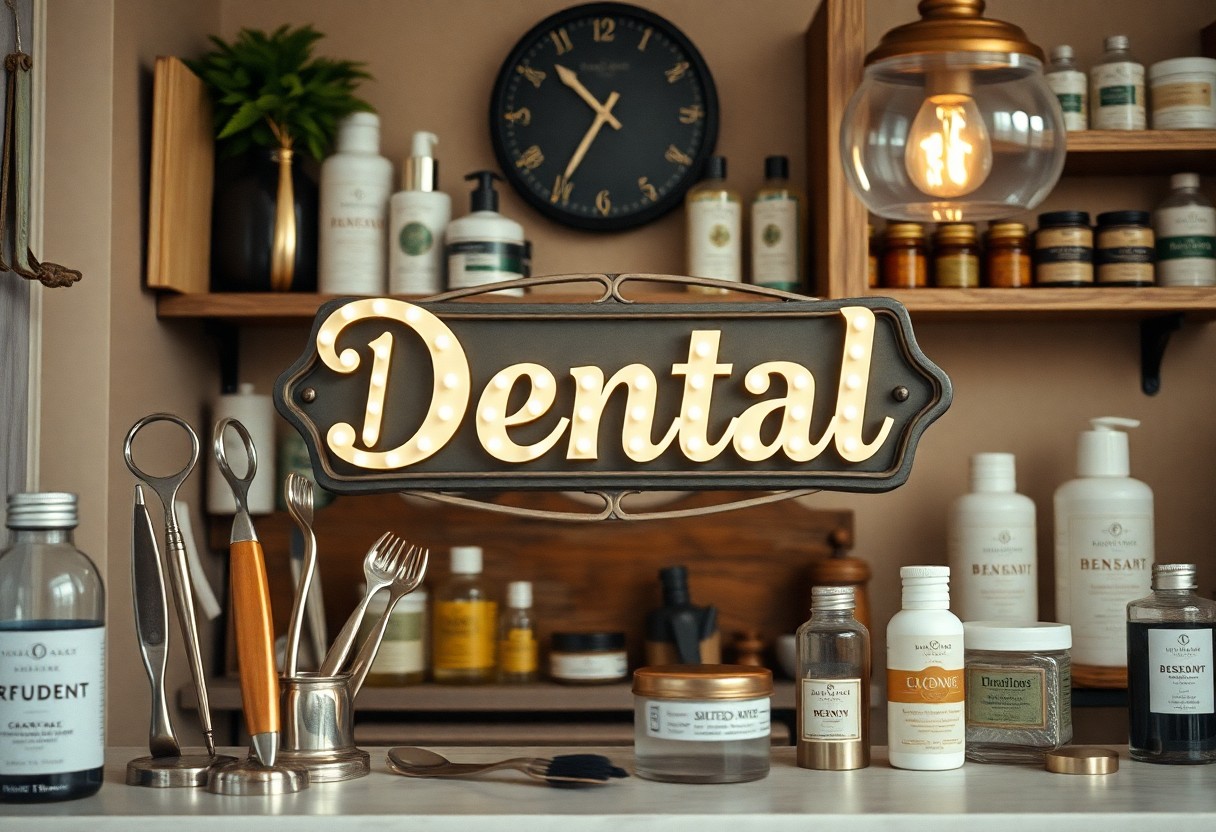You might be surprised to learn that the term “dental” originates from the Latin word “dens,” meaning tooth. This lineage highlights the strong connection between language and the field of dentistry, where the focus is primarily on oral health. As you explore the historical context of dental care and its terminology, you’ll uncover fascinating insights into how dental practices have evolved and how language reflects this journey. Understanding the origin of “dental” not only enriches your knowledge but also deepens your appreciation for the profession as a whole.
Key Takeaways:
- Etymology: The name dental is derived from the Latin word dentalis, which means ‘of the teeth’.
- Greek Influence: The term is also linked to the Greek word odous, which translates to ‘tooth’.
- Historical Context: The association of the term with teeth dates back to ancient civilizations that focused on oral health.
- Field of Study: Dental practices evolved with this nomenclature, particularly in relation to tooth care and oral hygiene.
- Modern Usage: Today, the term dental extensively applies to various aspects of oral health, including dentistry and dental hygiene.

Historical Background of Dental Terminology
While the term “dental” may seem modern, its roots trace back to ancient practices and languages. The word derives from the Latin “dentalis,” which means related to teeth. This term was influenced by the Greek word “odous,” meaning tooth. Over centuries, as societies advanced, so did the terminology associated with oral health, reflecting a growing understanding of dentistry and its importance in overall well-being.
Early Dental Practices
On the heels of understanding the term, early dental practices provide insight into humanity’s long history of oral care. Ancient civilizations employed various methods to address dental issues, often using rudimentary tools and natural remedies. You would find that these practices laid the foundation for the sophisticated techniques we use today.
Ancient Civilizations and Oral Health
Practices among ancient civilizations reveal your ancestors’ early attempts to manage oral health. Egyptians, for instance, used a mix of herbal remedies and dental tools, while the Greeks and Romans documented their observations on oral hygiene and treatment methods.
A closer look at these ancient civilizations shows a fascinating blend of early dentistry and cultural practices. The Egyptians developed toothpastes made from crushed bee’s wax and myrrh, and they crafted basic tools for extraction and cleaning. Similarly, Greeks like Hippocrates wrote about dental care, emphasizing the importance of oral hygiene. The Romans took this a step further by creating sophisticated dental instruments, underlining the evolving understanding of dental health throughout history. As you explore this heritage, you may appreciate how much of today’s dental knowledge stems from these foundational practices.
Etymology of the Term “Dental”
Any discussion about the term “dental” leads us to its rich linguistic history. This word is predominantly utilized in the field of dentistry, referring to anything related to teeth. Its etymological roots reveal broader connections that span various languages, helping you appreciate its significance in modern terminology.
Latin Roots
Above all, the term “dental” originates from the Latin word “dentalis,” which means “of the teeth.” This connection highlights how the ancient Romans emphasized dental health and anatomy, ultimately informing how you and others perceive dental care today.
Influence of Other Languages
Above the Latin influence, other languages have shaped the contemporary use of “dental.” For instance, terms related to dentistry in languages like Spanish (“dental”) and French (“dentaire”) showcase a commonality stemming from Latin roots, enriching your understanding of how languages evolve while retaining similar meanings.
To grasp the significance of language evolution, consider how the consistent use of “dental” across various cultures indicates a shared recognition of the importance of oral health. By understanding this linguistic intertwining, you can appreciate the universal emphasis on dental care, which transcends borders and highlights a common human concern for well-being.

Development of Dental Medicine
Unlike many medical fields, dental medicine has a rich history that has evolved significantly over time. The term “dental” encompasses a deep connection to oral health, seen through the ages as an vital part of healthcare. For more insights into the origins of the term, you can check Dental Surname Meaning & Dental Family History at Ancestry.
Evolution of Dentistry as a Profession
Any profession requires a foundation of knowledge and skill, and dentistry is no exception. Through the centuries, advancements have shaped the practices you see today in dental care. From early tooth extraction methods to modern restorative techniques, the journey of dentistry illustrates a commitment to improving oral health.
Key Figures in Dental History
The history of dentistry is filled with influential figures whose contributions shaped the field. Pioneers like Pierre Fauchard, known as the father of modern dentistry, helped formalize dental education and techniques. You might also explore the work of individuals like G.V. Black, who introduced standardized methods, significantly enhancing practices throughout the profession.
Considering these key figures, their innovations have paved the way for the world of dentistry as you know it today. Their legacies continue to influence modern practices, guiding the education of future dentists and impacting how you receive dental care. The dedication of these individuals underscores the evolution of dental medicine and its significance in promoting oral health worldwide.
Cultural Perspectives on Dentistry
Many cultures have unique approaches to dental care, reflecting their values, traditions, and beliefs. From ancient civilizations that understood the importance of oral hygiene to modern societies emphasizing preventive care, you can see how dental practices evolve within cultural contexts. Understanding these perspectives not only broadens your knowledge of dentistry but also enhances your appreciation for the different ways people maintain their oral health around the globe.
Dental Practices Across Cultures
After examining various cultures, you will discover that dental practices can range significantly. For instance, some indigenous cultures prioritize herbal remedies and natural techniques for oral care, while others may have rituals surrounding tooth care that have been passed down through generations. These diverse practices reflect how dental health is interwoven with cultural identities and local resources.
Perceptions of Oral Health
Any discussion on oral health must consider different perceptions held by various cultures. Attitudes towards dental hygiene, beauty, and health can significantly affect how individuals approach their dental care. You may find that some cultures emphasize the aesthetic aspects of oral health more than others, which can influence behaviors and practices in maintaining a healthy smile.
Perceptions of oral health vary widely between cultures, affecting your approach to dental care. For example, in some societies, a bright white smile is seen as a symbol of beauty and status, leading to greater attention to cosmetic dentistry. In contrast, other cultures might prioritize functionality over appearance, viewing oral health through the lens of traditional healing practices. Understanding these differing perceptions can enhance your appreciation for the multifaceted nature of dental care and its significance in diverse communities.
Modern Implications of the Term “Dental”
All aspects of modern healthcare recognize the importance of dental health. The term “dental” has transcended its origins and now encompasses a wide range of practices, technologies, and treatments aimed at improving oral hygiene and overall health. This broad perspective informs various fields, from cosmetic procedures to preventive care. To learn the roots of all your teeth’s names, you’ll find that understanding this terminology deepens your appreciation for oral health.
Advances in Dental Science
The field of dental science has seen remarkable advances, both in research and technology. Innovations such as digital imaging, laser treatments, and artificial intelligence are transforming how you approach dental care, making procedures faster, safer, and more efficient.
The Role of Dentistry in Healthcare
Dental practices play a significant role in your overall healthcare. They not only focus on oral health but also contribute to the early detection of serious health issues such as heart disease and diabetes. Regular visits to your dentist can help identify these conditions, enabling you to take proactive steps in managing your health.
Dental professionals are necessary partners in your healthcare journey. Your oral health is interconnected with your bodily health, making it important to prioritize regular check-ups and cleanings. By addressing dental issues promptly, you reduce the risk of complications that could impact other areas of your health. Therefore, maintaining communication with your dentist about any changes you experience can pave the way for a healthier future.
Conclusion
Upon reflecting on the origin of the name ‘dental,’ you can appreciate how it derives from the Latin word ‘dentalis,’ which means ‘of the teeth.’ This etymology underscores the significance of teeth in dental practices and education. Understanding this background not only enhances your knowledge of the field but also enriches your appreciation for the terminology associated with oral health. By connecting the name to its roots, you can better grasp the importance of dentistry in maintaining both individual and community well-being.
Q: What is the etymology of the term ‘dental’?
A: The term ‘dental’ originates from the Latin word ‘dentalis’, which means ‘of the teeth’. This Latin root is derived from ‘dens’, which translates to ‘tooth’. The word has evolved through various languages, but its core connection to teeth has remained, reflecting its association with dentistry and oral health.
Q: How has the meaning of ‘dental’ evolved over time?
A: Initially associated strictly with the anatomical aspect of teeth, the meaning of ‘dental’ has expanded to encompass various fields related to oral health. Today, it refers not only to the teeth themselves but also to the practices, studies, and treatments surrounding oral care, including dentistry, dental hygiene, and orthodontics. This broadening of meaning reflects the growing importance of oral health in overall well-being.
Q: Are there any related terms that share the same root as ‘dental’?
A: Yes, several terms share the same Latin root as ‘dental’. For instance, ‘dentist’ refers to a professional specializing in oral health and the treatment of teeth. ‘Dentistry’ encompasses the field of study and practice related to the care of teeth. Other related terms include ‘dentition’, which describes the arrangement of teeth in a mouth, and ‘edentulous’, meaning lacking teeth. All of these terms highlight the connection to teeth, stemming from the Latin origins.






